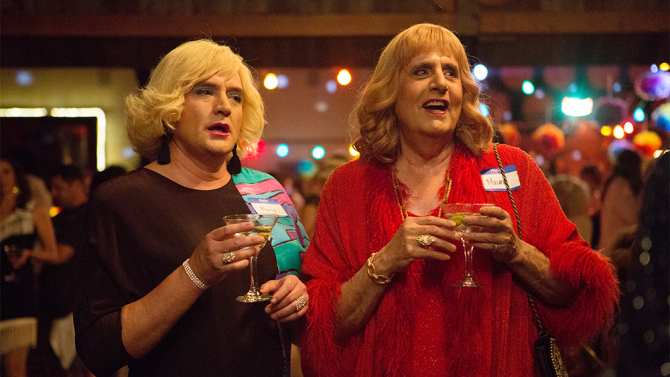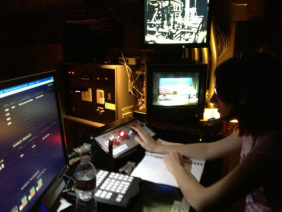As you can tell from the title, I've had to continually redraft this post as I get deeper into the series. Also: spoilers.
One. It seems so innocuous. Maura is at her new apartment; one of the other residents of the community (who we have never met) dies. When the ambulance arrives to take them away, the community gathers to watch/figure out what's going on/bear witness. The extras are queer. Like, so queer. Extremely. All of them. And I'm crying, because for the first time, we're in the background and the foreground. We are not just window dressing, nor just 'the issue.' We are everywhere.
Two. Maura, in a flashback, is surreptitiously trying to return a trans-related magazine to a shelf in a bookstore. There's another customer near the stand; it's deeply uncomfortable. Then the other customer murmurs, "that's last month's issue," and my heart breaks as Maura realizes that she isn't alone. I am so fortunate. I am so goddamn fortunate to live in the decade that I do.
One. It seems so innocuous. Maura is at her new apartment; one of the other residents of the community (who we have never met) dies. When the ambulance arrives to take them away, the community gathers to watch/figure out what's going on/bear witness. The extras are queer. Like, so queer. Extremely. All of them. And I'm crying, because for the first time, we're in the background and the foreground. We are not just window dressing, nor just 'the issue.' We are everywhere.
Two. Maura, in a flashback, is surreptitiously trying to return a trans-related magazine to a shelf in a bookstore. There's another customer near the stand; it's deeply uncomfortable. Then the other customer murmurs, "that's last month's issue," and my heart breaks as Maura realizes that she isn't alone. I am so fortunate. I am so goddamn fortunate to live in the decade that I do.
Three. Maura performs in a talent show. All three of her children have come to support her; all three of her children leave during her song. She sees; she knows; she keeps on going. Because that's how strong she is. That is how resilient she is. She holds it together. I want to be as strong as Maura. And the real beauty of this story is really coming together for me. This is a 'trans story' that isn't about how much it sucks to be trans, this is a story about how much it sucks when your family doesn't support and love you. Maura is not tragic; tragedy is done to her.
Four. Maura is listening to her ex-wife talk about the past. Her ex-wife refers to her as "he" a few times. She gently but firmly corrects her. Her ex-wife continues, switching to the appropriate pronouns. Their marriage broke up over this (and other things), and now she is able to make the change that the children are still struggling with. Because she still cares about Maura, enough to make a wry joke about having a gay marriage before it was cool. And I cry because Maura deserves this and so much more, and because I know that this isn't a linear "It Gets Better" story. This is not a floodgates moment. This is just a moment, one of many, and in this family, with these people, not all of those moments are going to be good.
Bonuses. Syd confessing that she's kind of in love with her best friend. Josh trying to decide how fucked up his relationship with Rita was. Maura at camp. Ali coming back for family dinner, in the end. I wasn't crying, I just had something in my eye, I swear.
Oh, and I've cried laughing at this show too (Maura's reaction to her first pill! and so much more), but that's another post.
Four. Maura is listening to her ex-wife talk about the past. Her ex-wife refers to her as "he" a few times. She gently but firmly corrects her. Her ex-wife continues, switching to the appropriate pronouns. Their marriage broke up over this (and other things), and now she is able to make the change that the children are still struggling with. Because she still cares about Maura, enough to make a wry joke about having a gay marriage before it was cool. And I cry because Maura deserves this and so much more, and because I know that this isn't a linear "It Gets Better" story. This is not a floodgates moment. This is just a moment, one of many, and in this family, with these people, not all of those moments are going to be good.
Bonuses. Syd confessing that she's kind of in love with her best friend. Josh trying to decide how fucked up his relationship with Rita was. Maura at camp. Ali coming back for family dinner, in the end. I wasn't crying, I just had something in my eye, I swear.
Oh, and I've cried laughing at this show too (Maura's reaction to her first pill! and so much more), but that's another post.



